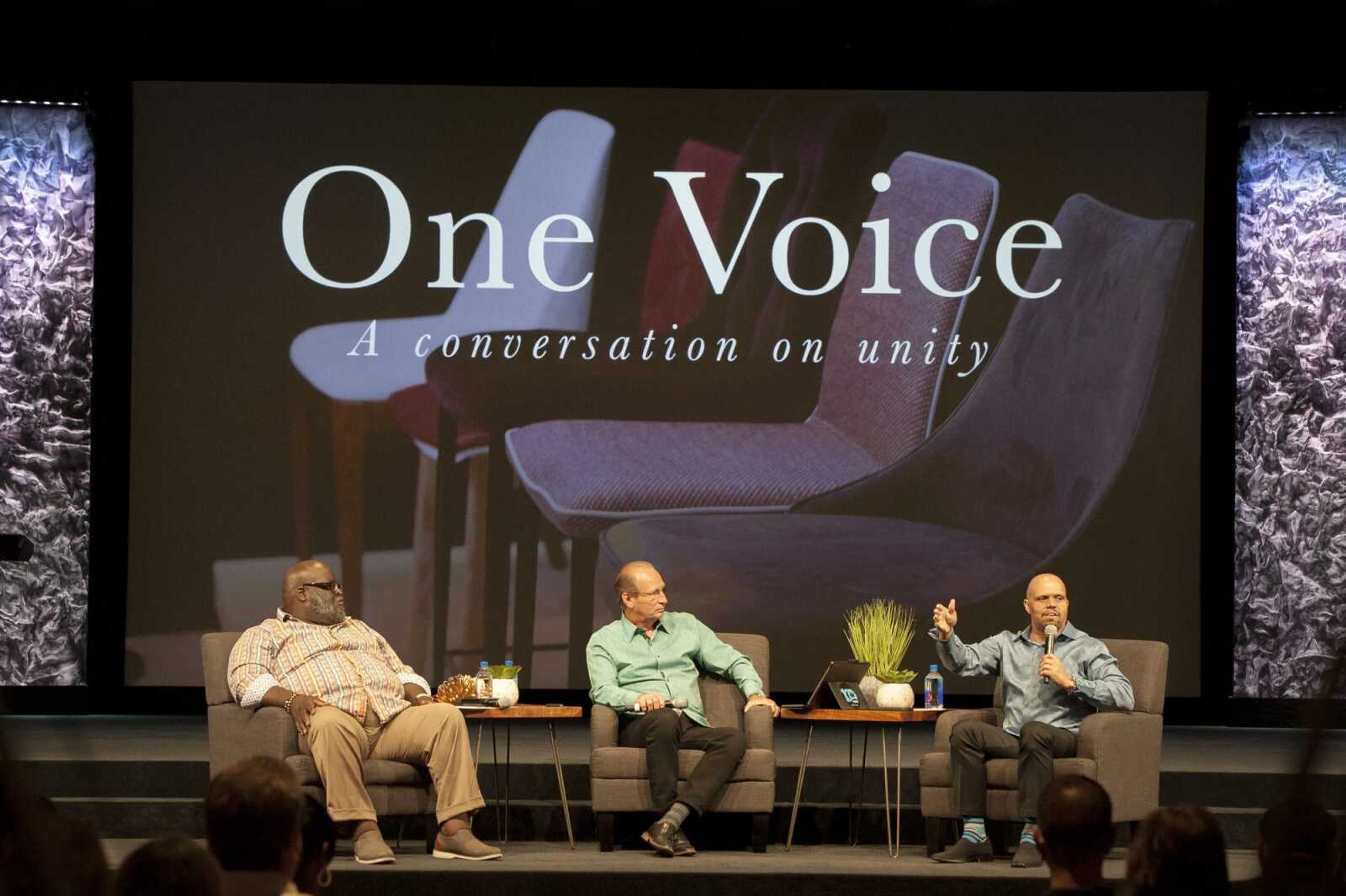Area pastors: Americans have to acknowledge racism to be able to deal with the problem
America has a race problem, and the first step to addressing it is to acknowledge it, said three pastors who held a roundtable discussion Tuesday night at Cape First Church in Cape Girardeau. Pastor Gary Brothers of Cape First, Apostle Adrian Taylor of Lighthouse Ministries in Cape Girardeau and Bishop Calvin Bird of New Covenant Church in Sikeston, Missouri, spoke of the importance of listening to understand, and acknowledging real problems that exist in America today, including racial unrest and white reluctance to accept responsibility, or even to acknowledge the experiences of Black people. ...
America has a race problem, and the first step to addressing it is to acknowledge it, said three pastors who held a roundtable discussion Tuesday night at Cape First Church in Cape Girardeau.
Pastor Gary Brothers of Cape First, Apostle Adrian Taylor of Lighthouse Ministries in Cape Girardeau and Bishop Calvin Bird of New Covenant Church in Sikeston, Missouri, spoke of the importance of listening to understand, and acknowledging real problems that exist in America today, including racial unrest and white reluctance to accept responsibility, or even to acknowledge the experiences of Black people.
The Rev. Byron Bonner of True Vine Ministries in Cape Girardeau did not attend as planned, due to illness, Brothers said.
“A mistake we make in community, especially in opposing issues, is to listen to respond instead of listening to understand, so we never really understand,” Brothers said. “If we address the real problems, just maybe we can make a difference right here in our hometown, in our area.”
“We have a problem because we don’t think we have a problem,” Bird said. “Too many times, we try to say it’s not going to happen here, but we have to talk about where we are here right now in Cape.”
Because a lot of things have not happened here, Bird said, we feel isolated from racism, but that’s not the case.
“It’s a major problem,” Bird said. “We can deal with it but we have to meet it head on. We can’t avoid that we have differences.”
Bird said it’s important to talk about subjects including white privilege.
“My white friends will say, ‘Calvin, I didn’t own slaves.’ ... But just because you didn’t do it doesn’t mean you don’t bear some responsibility for what happened,” Bird said.
Taylor said a major problem in the United States is white fragility, or the discomfort white people have when the subject of race comes up.
“That’s part of what creates difficulty finding real solutions,” Taylor said. When a white person dismisses a Black person’s experience, “that tells a Black person, ‘Whatever I feel is not valid.’ You have become part of a system of oppression without being the oppressor,” he said.
Racism is not the evil things people do, Taylor said, but is a system that affects each and every one of us.
Taylor put the issue in a biblical context, relating racism to the story of David and Goliath. Goliath’s arms symbolize racism, his head symbolizes white privilege, and the Israelites being frightened and running away symbolizes white fragility, he said.
Taylor said the rock David uses to fell Goliath symbolizes Jesus, and while Goliath falls, he doesn’t die until David cuts off his head.
Over the last several weeks, Taylor said, Americans have had a real opportunity to make forward progress beyond racial unrest.
“The video of George Floyd’s death made everyone, Black and white, understand there really is a problem that Black folks have been talking about for a long time,” Taylor said.
Floyd’s death at the hands of Minneapolis police has sparked protests around the world against racism.
Brothers said that when he heard the term “white privilege,” he didn’t see it until he started listening to his fellow ministers describe their experiences.
“We don’t see what we don’t see,” Brothers said. But, he added, “Change starts with here, saying, ‘I can’t do everything, but I can do everything I can.’”
Bird said a major concern is, not everyone wants to see change, but those who do can be the light.
“We’ve got to understand that as we’re moving forward, that we are going to have to be a light,” Bird said. “That light will have to shine so tough that every bit of darkness gets exposed. ... We are going to have to make a stand. The Bible says that you are the light of the world, and if we’re the light of the world, set on a hill, we cannot bury our head in the sand. We’re going to have to stand up and let our lights shine. ... It will make a difference.”
Brothers said, from a practical perspective, the way to enact real change is to take a look at the filter each one of us has. If it’s clogged, it’s harder to hear and understand others’ experiences, so it’s important to begin to hear and try to process what we don’t understand.
Bird said one solution is to begin to work to see things from others’ vantage points.
“Your opinion is based on your history. It’s not based on my history,” Bird said. “Before you judge anyone, let’s take a look at another vantage point.”
When something isn’t right, Bird said, a simple speak-up goes a long way.
Taylor said we have to realize racism is not a problem just for people of color.
“It’s a problem all of us have to embrace, because each one of us has something to contribute toward betterment or worsening of our world every day,” Taylor said.
Connect with the Southeast Missourian Newsroom:
For corrections to this story or other insights for the editor, click here. To submit a letter to the editor, click here. To learn about the Southeast Missourian’s AI Policy, click here.











